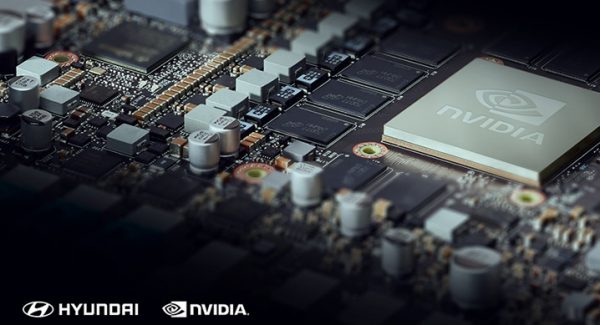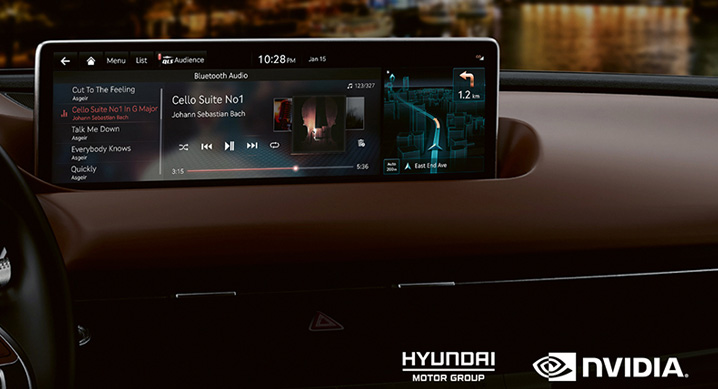From 2022 onwards, all new models from Hyundai, Kia and Genesis will be equipped with the Nvidia Drive in-vehicle infotainment system as standard. According to Hyundai Motor Group, this includes entry-level cars as well.
Perpetually updatable over-the-air, the infotainment system incorporates a hardware and software stack that combines audio, video, navigation, connectivity and AI-based ‘connected car’ services. It is already available on the Genesis GV80 and G80, which were both unveiled earlier this year.
On top of the infotainment system, both companies are also working on an advanced integrated digital cockpit, which is scheduled for launch in late 2021. The Korean automaker is also set to roll out its next ‘connected car operating system’ (ccOS) in future models, although no definite timeline has been given for this.

Here’s the official press release with more information:

PRESS RELEASE
Hyundai Motor Group and NVIDIA announced today the roll-out of the NVIDIA DRIVE ‘connected car’ platform across all new models from Hyundai, Kia and Genesis from 2022 onwards.
The technical cooperation with NVIDIA, the global leader in accelerated computing, will enable Hyundai Motor Group to develop high-performance ‘connected car’ computing systems for its next-generation models. From entry-level to premium vehicles, all future models will feature in-vehicle infotainment (IVI) systems powered by NVIDIA DRIVE as standard. NVIDIA DRIVE includes a hardware and software stack, enabling Hyundai Motor Group’s IVI systems to combine audio, video, navigation, connectivity and artificial intelligence (AI)-based ‘connected car’ services.
Using the high-performance, energy-efficient NVIDIA DRIVE platform for its future models will allow the Group’s brands to offer customers seamless and continuously enhanced in-vehicle AI user experiences. Hyundai, Kia and Genesis customers will therefore benefit from a feature-rich, software-defined AI user experience that is perpetually updateable.
Hyundai Motor Group has been working with NVIDIA since 2015, and the NVIDIA DRIVE platform already underpins the advanced IVI systems found in the Genesis GV80 and G80. The companies have also been collaborating on an advanced integrated digital cockpit, due to be launched in late 2021. Today’s announcement takes the relationship further, as Hyundai Motor Group lays the foundations for IVI systems that can support a wide range of future apps and features, across its entire model line-up.
“NVIDIA brought consumer electronic functionality and a graphics-rich user interface to infotainment systems more than a decade ago,” said Ali Kani, Vice President of Autonomous Vehicles at NVIDIA. “Now, we are once again transforming these systems through the power of AI, helping Hyundai Motor Group increase safety and value, along with enhancing customer satisfaction, throughout the lifetime of the vehicle.”
“At Hyundai Motor Group, we are committed to delivering greater value, safety, functionality and enjoyment over the lifetime of the car,” said Paul Choo, Senior Vice President of Electronics Tech Unit at Hyundai Motor Group. “The NVIDIA DRIVE platform is proven – it is scalable, energy-efficient and has the performance to support our next generation of software-defined vehicles.”
Partnership with NVIDIA enables creation of next ccOS
The partnership with NVIDIA will enable Hyundai Motor Group to roll out its next ‘connected car operating system’ (ccOS) in future models. Developed in-house by Hyundai Motor Group, the new ccOS will bring together the large amount of data generated by the vehicle and its network of sensors, as well as external connected car data centers, providing a more pleasurable and convenient experience for the driver and occupants.
The ccOS will use NVIDIA’s software frameworks to implement four core IT competencies:
ㆍ ‘High-performance computing’, using NVIDIA GPUs to process large amounts of data inside and outside the vehicles and optimize system performance to support advanced IT technologies, such as deep learning.
ㆍ ‘Seamless computing’, which provides uninterrupted service regardless of the vehicle’s online or offline state. The vehicle connects with the surrounding infrastructure and smart devices to bring the user experience from external devices into the vehicle environment.
ㆍ ‘Intelligent computing’, providing intelligent customized services by properly identifying the driver’s intentions and condition.
ㆍ ‘Secure computing’, protecting the system by monitoring in-vehicle and external networks and isolating data associated with vehicle safety.
Furthermore, recent breakthroughs in AI and accelerated computing have opened the door for next-generation vehicles to benefit from new functionality, capabilities and enhanced safety features that can be added after the car is purchased. With a centralized, software-defined computer architecture, future vehicles can be updated throughout their lives to feature the latest in advanced digital cockpit technology, as well as other features.
Hyundai Motor Group will announce more specific details of its upcoming IVI and ccOS capabilities in line with future announcements relating to specific vehicles.



